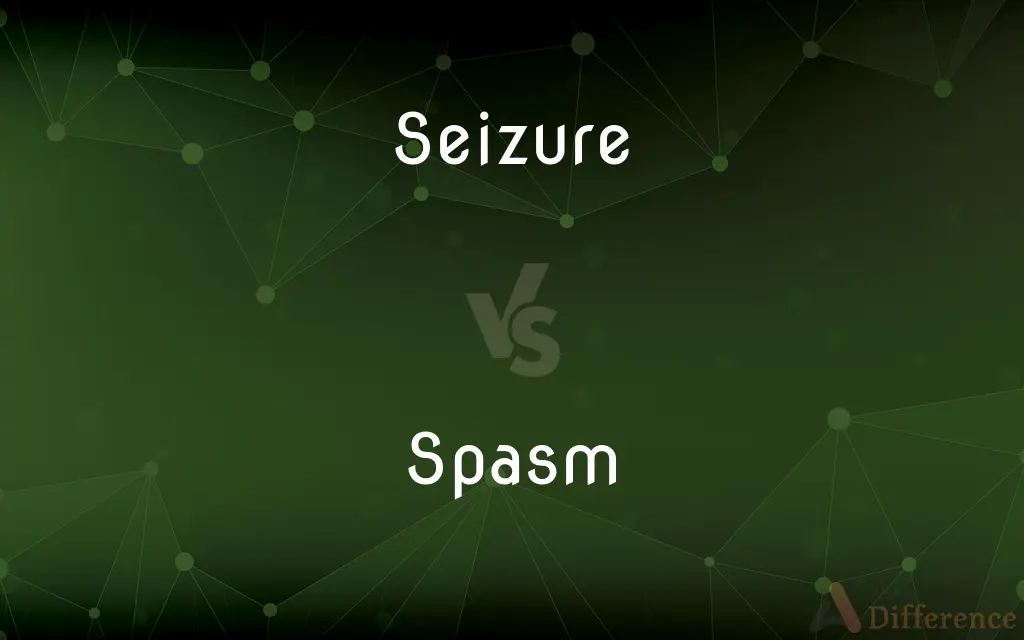Seizure vs. Spasm — What's the Difference?
By Maham Liaqat & Fiza Rafique — Updated on April 1, 2024
Seizures involve sudden, uncontrolled electrical disturbances in the brain, potentially causing changes in behavior, movements, or consciousness. Spasms are sudden, involuntary muscle contractions, often localized and without changes in consciousness.

Difference Between Seizure and Spasm
Table of Contents
ADVERTISEMENT
Key Differences
Seizures are characterized by sudden electrical disturbances in the brain that can affect behavior, movements, and consciousness. On the other hand, spasms refer to sudden, involuntary muscle contractions.
Seizures and spasms, while both involving involuntary actions, differ primarily in their causes and manifestations. A seizure is a brain-related event that can have widespread effects on the body, potentially leading to unconsciousness and convulsions. Spasms, however, are strictly muscular events, often localized and without the same level of systemic impact.
The treatment and management of seizures and spasms also differ. Seizures may require antiepileptic drugs (AEDs) or other interventions targeting the brain, while spasms might be managed with muscle relaxants, physical therapy, or treatments addressing the underlying cause. Understanding these differences is crucial for appropriate medical intervention.
Comparison Chart
Definition
Sudden electrical disturbances in the brain.
Sudden, involuntary muscle contractions.
Causes
Epilepsy, fever, brain injury, etc.
Muscle fatigue, excessive use, neurological disorders.
ADVERTISEMENT
Symptoms
Changes in behavior, movements, consciousness, convulsions.
Localized muscle contraction, pain.
Impact on Consciousness
Can affect consciousness.
Does not typically affect consciousness.
Treatment
Antiepileptic drugs (AEDs), lifestyle changes, surgery.
Muscle relaxants, physical therapy.
Compare with Definitions
Seizure
Requires medical diagnosis and treatment.
Seizure management often involves medication to control its occurrence.
Spasm
Treatment can include physical therapy or muscle relaxants.
She found relief from the spasms after starting physical therapy.
Seizure
Can lead to changes in behavior, movement, feelings, and levels of consciousness.
During the seizure, he was unaware of his surroundings.
Spasm
Often localized to a specific part of the body.
The spasm in her back made it difficult to stand straight.
Seizure
May involve convulsions or other physical manifestations.
The severity of a seizure can range from a momentary disruption of senses to vigorous shaking.
Spasm
Can occur as a result of muscle fatigue or neurological disorders.
The doctor said the spasms might be due to an underlying neurological condition.
Seizure
A sudden, uncontrolled electrical disturbance in the brain.
The patient experienced a seizure that lasted for two minutes.
Spasm
A sudden, involuntary muscle contraction.
After running, he experienced a painful spasm in his calf.
Seizure
Might be related to epilepsy or other medical conditions.
After several tests, the doctor diagnosed her with epilepsy, explaining the seizures.
Spasm
Does not affect consciousness.
Despite the spasms, she remained fully aware of her surroundings.
Seizure
A seizure, formally known as an epileptic seizure, is a period of symptoms due to abnormally excessive or synchronous neuronal activity in the brain. Outward effects vary from uncontrolled shaking movements involving much of the body with loss of consciousness (tonic-clonic seizure), to shaking movements involving only part of the body with variable levels of consciousness (focal seizure), to a subtle momentary loss of awareness (absence seizure).
Spasm
A spasm is a sudden involuntary contraction of a muscle, a group of muscles, or a hollow organ such as the bladder. A spasmodic muscle contraction may be caused by many medical conditions, including dystonia.
Seizure
The act or an instance of seizing or the condition of being seized.
Spasm
A sudden, involuntary contraction of a muscle or group of muscles.
Seizure
A sudden attack, spasm, or convulsion, as in epilepsy or another disorder.
Spasm
A sudden burst of energy, activity, or emotion.
Seizure
The act of taking possession, as by force or right of law.
The seizure of a thief, a property, a throne, etc.
The search warrant permitted the seizure of evidence.
Spasm
A sudden, involuntary contraction of a muscle, a group of muscles, or a hollow organ.
Jessica went into spasms after eating a peanut.
Seizure
A sudden attack or convulsion, (e.g. an epileptic seizure).
He fell to the floor and convulsed when the epileptic seizure occurred.
Spasm
A violent, excruciating seizure of pain.
Seizure
A sudden onset of pain or emotion.
He felt the sudden seizure of pain as the heart attack began.
Spasm
A sudden and temporary burst of energy, activity, or emotion.
Seizure
That which is seized, or taken possession of; a thing laid hold of, or possessed.
Spasm
To produce and undergo a spasm or series of spasms.
Seizure
(obsolete) Retention within one's grasp or power; possession; ownership.
Spasm
An involuntary and unnatural contraction of one or more muscles or muscular fibers.
Seizure
To undergo an epileptic seizure.
Spasm
A sudden, violent, and temporary effort or emotion; as, a spasm of repentance.
Seizure
The act of seizing, or the state of being seized; sudden and violent grasp or gripe; a taking into possession; as, the seizure of a thief, a property, a throne, etc.
Spasm
A painful and involuntary muscular contraction
Seizure
Retention within one's grasp or power; hold; possession; ownership.
Make o'er thy honor by a deed of trust,And give me seizure of the mighty wealth.
Seizure
That which is seized, or taken possession of; a thing laid hold of, or possessed.
Seizure
A sudden occurrence (or recurrence) of a disease;
He suffered an epileptic seizure
Seizure
The act of forcibly dispossessing an owner of property
Seizure
The act of taking of a person by force
Seizure
The taking possession of something by legal process
Common Curiosities
Can someone have a seizure without epilepsy?
Yes, seizures can occur in individuals without epilepsy due to factors like fever or chemical imbalances.
What causes a seizure?
Seizures are caused by sudden electrical disturbances in the brain, which can be due to epilepsy, brain injury, or other health conditions.
Are seizures and spasms treatable?
Yes, both conditions are treatable, with seizures often managed with medication and lifestyle changes, and spasms with physical therapy and muscle relaxants.
How do you know if it's a seizure or spasm?
Seizures often involve changes in consciousness and can affect the entire body, while spasms are localized muscle contractions without consciousness impact.
How can epilepsy be diagnosed?
Epilepsy is diagnosed through neurological examinations and tests like EEGs that monitor brain activity.
Do all seizures involve convulsions?
No, there are different types of seizures, and not all involve convulsions.
What are the common treatments for spasms?
Common treatments include muscle relaxants, physical therapy, and addressing the underlying cause.
Can spasms be a sign of a serious condition?
While spasms are often benign, resulting from muscle fatigue, they can sometimes indicate neurological disorders.
Can dehydration cause spasms?
Yes, dehydration can lead to muscle spasms due to electrolyte imbalances.
Is it possible to prevent spasms?
Preventing spasms involves staying hydrated, avoiding muscle overuse, and managing underlying health conditions.
What are the long-term effects of frequent seizures?
Frequent seizures can impact brain function and cognitive abilities, and in some cases, lead to status epilepticus, a life-threatening condition.
Can exercise help with managing seizures or spasms?
Exercise can be beneficial for both conditions but should be approached with caution and tailored to the individual's needs.
Are there different types of seizures?
Yes, seizures can be classified into several types, including focal, generalized, and absence seizures, among others.
Can stress cause spasms?
Yes, stress can trigger muscle spasms by causing muscles to tighten up involuntarily.
How long do seizures last?
Seizures can last from a few seconds to several minutes, depending on the type.
Share Your Discovery

Previous Comparison
Conference vs. Journal
Next Comparison
Squid vs. PrawnAuthor Spotlight
Written by
Maham LiaqatCo-written by
Fiza RafiqueFiza Rafique is a skilled content writer at AskDifference.com, where she meticulously refines and enhances written pieces. Drawing from her vast editorial expertise, Fiza ensures clarity, accuracy, and precision in every article. Passionate about language, she continually seeks to elevate the quality of content for readers worldwide.
















































